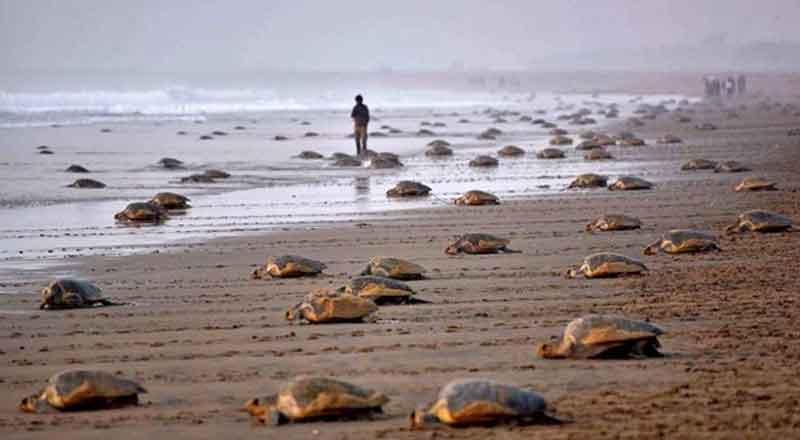- In a proactive move to safeguard the delicate nesting process of Olive Ridley Sea turtles, Odisha authorities have instituted a ban on visitor access to all mass nesting sites.
- This regulatory action comes in response to observed detrimental behaviors exhibited by visitors, including the use of bright lights for observation and the capture of photographs or videos.
- The affected nesting sites encompass key locations such as Gahirmatha beach in Kendrapara district, Devi river mouth in Puri, and Rushikulya river mouth in Ganjam district.
- Olive Ridley sea turtles hold protected status under Schedule-I of the Wildlife (Protection) Act, 1972, emphasizing the legal imperative to safeguard their habitat and nesting grounds.
- This decisive action reaffirms Odisha’s unwavering commitment to wildlife preservation and underscores the state’s dedication to protecting its natural heritage.
In a proactive move to safeguard the delicate nesting process of Olive Ridley sea turtles, Odisha authorities have instituted a ban on visitor access to all mass nesting sites until the completion of hatchling emergence. The directive, issued by Principal Chief Conservator of Forests (Wildlife), Sushanta Nanda, aims to mitigate disturbances caused by human activities that pose risks to the turtles and their offspring.
This regulatory action comes in response to observed detrimental behaviors exhibited by visitors, including the use of bright lights for observation and the capture of photographs or videos. Such practices not only disrupt the nesting process but also present hazards to the vulnerable hatchlings. Additionally, overcrowding at nesting sites exacerbates these challenges, further impeding the turtles’ natural nesting behaviors.
The affected nesting sites encompass key locations such as Gahirmatha beach in Kendrapara district, Devi river mouth in Puri, and Rushikulya river mouth in Ganjam district. With the onset of mass nesting anticipated in the coming days, the implementation of this ban underscores the state’s commitment to wildlife conservation during this critical period.
Olive Ridley sea turtles hold protected status under Schedule-I of the Wildlife (Protection) Act, 1972, emphasizing the legal imperative to safeguard their habitat and nesting grounds. Any activities that disrupt their nesting process are categorized as ‘hunting’ under this legislation, underscoring the severity of infringements against these endangered species.
The government’s official order underscores the paramount importance of adhering to legal provisions aimed at the conservation of Olive Ridley sea turtles. It mandates the immediate closure of all mass nesting sites to visitors until the hatchlings have completed their emergence and safely embarked on their journey to the sea.
This decisive action reaffirms Odisha’s unwavering commitment to wildlife preservation and underscores the state’s dedication to protecting its natural heritage. By enacting these protective measures, Odisha aims to ensure the continued survival and thriving population of Olive Ridley sea turtles for generations to come.
(With inputs from agencies)





